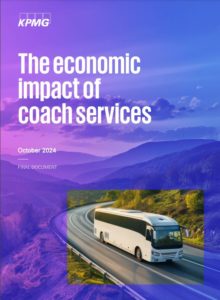Coach passengers spend £8.3 billion annually in Britain
New independent research commissioned by the Confederation of Passenger Transport (CPT) emphasises the strong economic benefit the coach sector has across Britain.
Conducted by KPMG, ‘The Economic Impact of Coach Services’ quantifies the financial benefits of coach services to the British economy, including direct impacts for passengers and operators, and additional benefits that arise for supply chains, commerce and communities. It says just one additional coach with 49 passengers every day can deliver as much as £1 million of economic value annually to a destination. The study highlighted that the coach industry in Britain supports 81,000 jobs, generating £6.4 billion of economic value through employment. It says coaches provide 450 million journeys a year in Britain – equivalent to 40% of all journeys taken by rail.
The research was conducted by KPMG UK between May and September 2024. In addition to an economic analysis built from multiple sources of publicly available data, an engagement phase of research was undertaken with a range of key stakeholders across England, Wales and Scotland. The resulting analysis covers Great Britain (occasionally UK) as a whole, with nation breakdowns for England, Scotland and Wales.
“To reap these benefits every city, town and tourist destination must plan for coach” – CPT’s CEO Graham Vidler
Launching the research in Blackpool just one day before the start of two major tourist events – the Lightpool and Sequence Dance Festivals – CPT’s CEO Graham Vidler said: “This new research shows that towns or destinations that can welcome one extra coach every day could bring up to £1 million a year into their local economy.
Festivals – CPT’s CEO Graham Vidler said: “This new research shows that towns or destinations that can welcome one extra coach every day could bring up to £1 million a year into their local economy.
“To reap these benefits every city, town and tourist destination must plan for coach, so they offer adequate coach parking and good facilities for both passengers and coach drivers as part of their sustainable travel and tourism strategy.”
The research reveals that across Britain coaches facilitate 450 million journeys each year and coach passengers spend £8.3 billion every year in local economies. Around £2.3 billion comes from passenger spending on leisure and shopping trips. Day-trippers using coaches spend £3.5 billion per year. Domestic coach passengers who stay overnight at their destination add £1.9 billion to the economy annually. International tourists travelling by coach spend over £600m.
Furthermore, the report says the coach industry is a substantial employer, with high concentrations of jobs in areas such as Cornwall, the Scottish Highlands and mid-Wales which are particularly reliant on coach connections to reach major hubs.
Some 54,000 people are employed directly in the industry – including drivers, mechanics, operations managers and customer service representatives. The industry supports a further 27,000 jobs in its supply chain. Collectively, these jobs contribute £6.4 billion to the economy.
A survey of 23 Local Transport Authorities (LTAs) Local Transport Plans (LTPs) conducted in 2023 by CPT revealed that very few of them considered coaches beyond basic references, such as how they facilitate long distance coach services. CPT commissioned this research to establish a source of economic data that demonstrates the value that coach passengers contribute towards local economies throughout England, Scotland and Wales. This research will be used to encourage LTAs to address provision of facilities and better access for coach services as a routine part of their transport planning, especially (though not only) in areas where there is already proven evidence of significant tourism activity.
The research was launched in Blackpool on the same day the city was re-awarded its CPT Coach Friendly status. This award recognises the efforts made by Blackpool Council to create the right conditions for coaches to operate and to encourage more coach tourism.
The coach sector’s contribution is particularly pronounced in parts of the country with rural populations, and in parts of the country with less extensive rail services. For example, the coach sector’s employment and supply chain is worth over £425 million in Wales and £640 million in Scotland.
| Region | Coach industry (wages, taxes, investment in supply chains) economic impact £ | Better connections (Increased connectivity, access to low cost travel, impact on other road users) £ | Passengers at their destination (shopping, leisure and tourism spend) £ |
| East Midlands region | 215m | 195m | 570m |
| East Midlands CA | 65m | 80m | 240m |
| London | 1,210m | 345m | 1,525m |
| North East region | 345m | 110m | 265m |
| North East CA | 295m | 80m | 215m |
| Tees Valley CA | 55m | 30m | 45m |
| North West region | 920m | 300m | 895m |
| Liverpool City region | 200m | 60m | 155m |
| Greater Manchester | 365m | 115m | 280m |
| South East | 740m | 370m | 1,170m |
| South West region | 460m | 230m | 795m |
| West of England CA | 65m | 40m | 220m |
| West Midlands region | 430m | 235m | 660m |
| West Midlands CA | 165m | 115m | 265m |
| Yorkshire and the Humber region | 400m | 225m | 620m |
| York and North Yorkshire CA | 75m | 35m | 145m |
| West Yorkshire CA | 120m | 95m | 210m |
| South Yorkshire CA | 140m | 55m | 110m |
| Scotland | 635m | 185m | 675m |
| Wales | 425m | 105m | 395m |